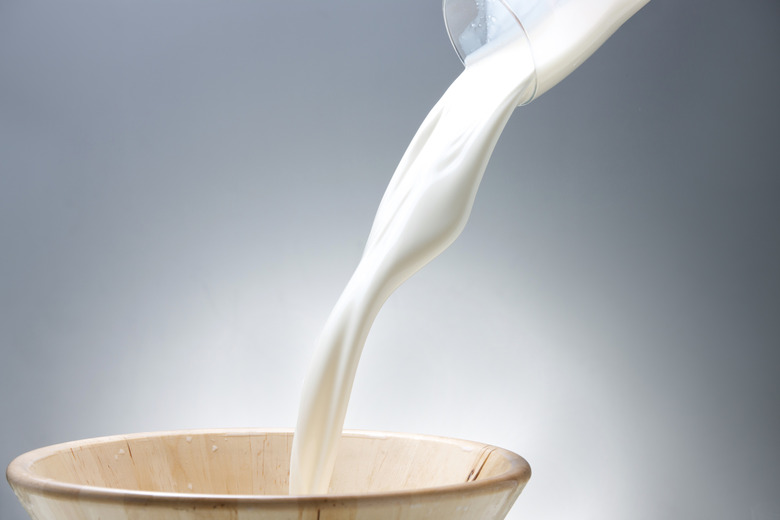Pounds To Gallons Conversion
Pounds are units of weight, and gallons are units of volume, so you can't directly convert one to the other. You can, however, determine the volume of a particular liquid when you know its weight, and vice versa, as long as you know the density of the liquid. You can find the densities of many common liquids such as milk and gasoline online, but you may have a random mixture of two or more liquids. In that case, you can measure the density yourself in one of two ways.
Measure Density Directly
Measure Density Directly
The density (d) of a liquid is the mass (m) of the liquid per unit volume (V). The formula is d = m/V. If you have a random liquid and you want to know its density, the procedure is simple.
Weigh a graduated beaker. Pour in some of the liquid you need to measure, record the new weight and subtract the weight of the beaker to get the weight of the liquid. Now check the reading on the beaker to get the volume of the liquid. Divide the weight by the volume to get the density. Note that, for density calculations, the terms "mass" and "weight" have essentially the same meaning.
Measure Specific Gravity With a Hydrometer
Measure Specific Gravity With a Hydrometer
The most common liquid on earth – water – has a density of approximately 1 gram per milliliter at room temperature. Dividing the density of a liquid expressed in g/ml by the density of water in the same units produces a dimensionless number called the specific gravity. In most cases, the specific gravity of a liquid and its density expressed in grams per milliliter are essentially the same number.
You can use a graduated tubular testing instrument known as a hydrometer to measure the specific gravity of a particular liquid. To do this, you fill the tube about three-quarters full of the liquid you want to measure and then drop the tube gently into a larger beaker full of water and allow it to float. Note the reading on the side of the tube. This reading is the specific gravity of the liquid, which is also its density in grams/milliliter.
Convert Density to Pounds per Gallon
Convert Density to Pounds per Gallon
After finding the density of a liquid, you may have to convert units to determine how many pounds are in a gallon. Here are some conversion factors you may need:
- 1 U.S. pound = 0.4536 kilograms = 453.6 grams
- 1 gram = 0.001 kilograms = 0.0022 pounds
- I U.S. gallon = 3.78 liters = 0.00378 cubic meters = 3,780 milliliters
- 1 liter = 0.001 cubic meters = 0.264 gallons
- 1 milliliter = 0.000264 gallons
Using these factors, we find that:
1 g/ml =1,000 kg/m3 = 8.333 lb/gal.
1 lb/gal = 0.12 g/ml = 120 kg/m3
Example Calculations
Example Calculations
Once you know the density of any liquid, and you have converted it to pounds/gallon, you can convert weight in pounds to its corresponding volume in gallons, and vice versa. Here are some examples:
**Turpentine –** The density of turpentine is 868.2 kg/m3 (0.8682 g/ml) at room temperature. Knowing that 1 g/ml = 8.333 lb/gal, we find the density of turpentine to be 7.234 lb/gal. A sample of turpentine weighing 1 pound has a volume of 0.138 gallons.
Crude Oil – Crude Texas oil has a density of 873 kg/m3, while crude Mexican oil has a density of 973 kg/m3. These densities are equivalent to 7.27 lb/gal and 8.11 lb/gal respectively. One pound of crude Texas oil has a volume of 0.137 gallons whereas one pound of crude Mexican oil has a volume of only 0.123 gallons. That's a difference of more than a 10 percent.
Milk – The specific gravity of milk varies with fat and protein content. Cream, with a specific gravity of 0.994 at room temperature, is less dense than water, whereas homogenized milk, with a specific gravity of 1.022, is denser. Converting specific gravity to g/ml and then to lb/gal, we find that a gallon of cream weighs 8.28 pounds whereas a gallon of homogenized milk weighs 8.51 pounds, or about 2.5 percent more.
Cite This Article
MLA
Deziel, Chris. "Pounds To Gallons Conversion" sciencing.com, https://www.sciencing.com/pounds-gallons-conversion-5163930/. 13 March 2018.
APA
Deziel, Chris. (2018, March 13). Pounds To Gallons Conversion. sciencing.com. Retrieved from https://www.sciencing.com/pounds-gallons-conversion-5163930/
Chicago
Deziel, Chris. Pounds To Gallons Conversion last modified March 24, 2022. https://www.sciencing.com/pounds-gallons-conversion-5163930/
